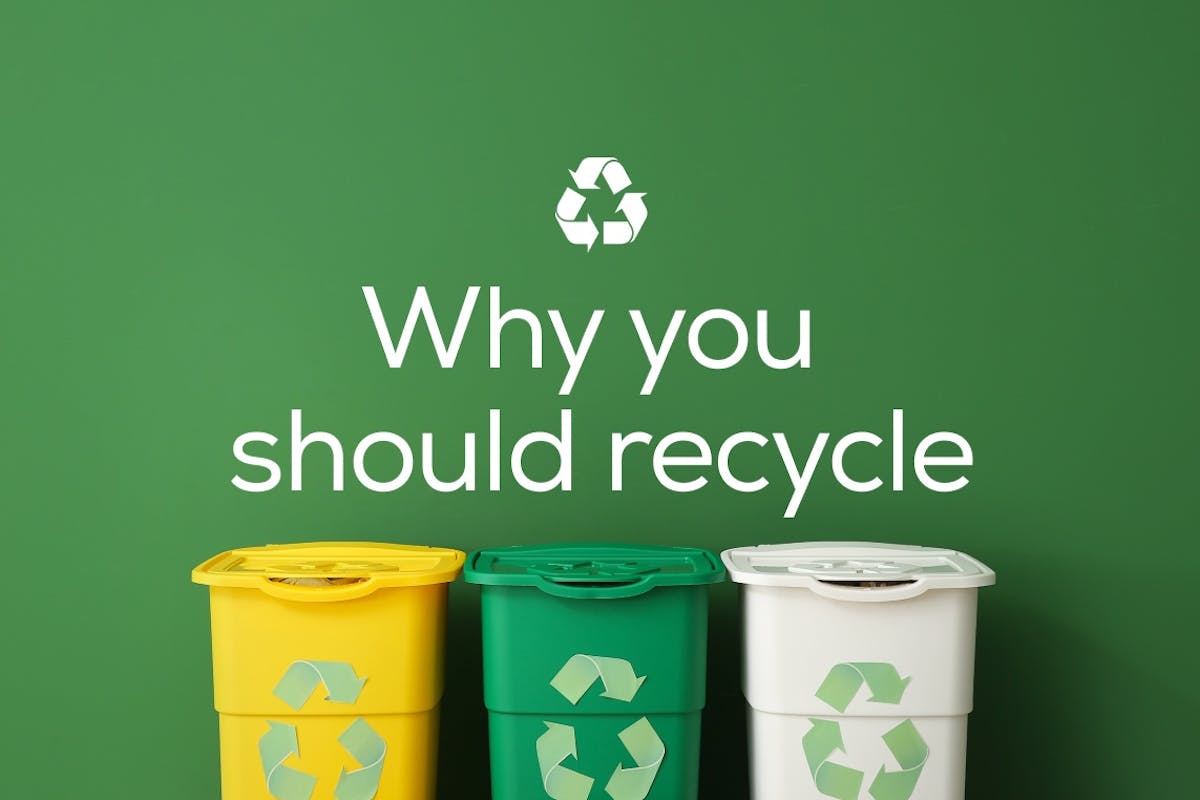Is Recycling Worth It? Environmental and Economic Benefits and Challenges
Last edited
Author
Andrew Giermak
Solar and Electrification Writer and Editor
Editor
Ryan Barnett
SVP, Policy & New Market Development

Recycling in the United States can be traced back to glass bottles being returned to beer, soda, or milk companies in the late 19th century. Curbside recycling pick-up started in the 1960s and now covers about three-quarters of homes in the U.S. While the percentage of waste Americans recycle has risen substantially over the last four decades, it’s still only at about 32%.
By taking just a few minutes to sort out your recyclable waste, you can directly contribute to the economic well-being of your community and reduce your carbon footprint. At Palmetto, our mission includes spreading home solar power and home electrification, but we care about every idea that can help our environment. If you still have questions about recycling — What materials can I recycle? How can I do a little more? And, why should I recycle? — we have answers. Here are the benefits of all of us reducing, reusing, and recycling better.
See how much you can save with home energy changes
Environmental Benefits of Recycling
Recycling encourages us to be mindful of our resource consumption and our trash creation. By reducing both, we can improve our local and global environment.
Conserves natural resources
Despite the seeming abundance of natural resources on this planet, they aren’t limitless. We can’t rely on them for crafting new products forever.
- Almost all plastics come from the extraction of fossil fuels, a huge source of energy consumption and resource allocation.
- Paper is easy to recycle, but we still chop down too many trees, which are essential to maintaining our ecosystems.
These materials cannot be quickly replenished, so reducing our intake is vital. This is one of the most important reasons to recycle.
Reduces pollution and greenhouse gases
Because recycling reduces our need for new materials made out of natural resources, it lowers the amount of air and water pollution created in both extraction and production processes.
Recycling a ton of paper can save the same amount of energy as consuming 322 gallons of gas according to the EPA, avoiding even more greenhouse gases we work to combat climate change.
For example, the most commonly recycled material, plastic, is one of the largest polluters during initial production.
Here’s a troubling but true thought from the University of Colorado, it takes more than 1,000 years for plastic to decompose.
By recycling more plastic products, we can drastically cut the amount of pollution that enters the environment. The EPA also reports that recycling 10 plastic bottles saves the amount of energy equivalent to powering a laptop for more than 25 hours.
In 2021, the U.S. generated about 40 million tons of plastic waste and recycled about two million tons of it, about 5-6%. About 98% of single-use plastic is made from fossil fuels.
Reduces landfill waste
Although many waste products can be recycled, the Environmental Protection Agency (EPA) estimates only 32% of trash is currently recycled or composted.
With 68% of our products ending up in landfills, we waste resources, take up valuable land, and create environmentally unhealthy zones. Increasing our recycling rates will help our communities and the planet overall.
Conserves energy
Recycling materials into new products uses far less energy than creating new materials. It is estimated that recycling, composting, combustion with energy recovery, and landfilling of municipal solid waste saved over 193 million metric tons of carbon dioxide equivalent, according to the EPA.
That equals a reduction in carbon emissions that would result from taking almost 42 million cars off the road each year. Considering our low recycling rates, these are very impressive numbers, and increasing our recycling habits could make an even bigger impact on saving energy and waste management.
Economic Benefits of Recycling
Because of its relationship with the manufacturing industry, recycling can provide many economic benefits.
Creates better jobs
According to the EPA, recycling programs and reuse activities in the United States accounted for 681,000 jobs within a single year. The EPA in 2024 also reported that for every 10,000 tons of recycled material about 16 new jobs are created.
Lowers production costs
Recycling materials can lower or reduce the energy cost of production by up to 95%. This can help offset recycling costs.
Supports economic justice
The creation of landfill sites and natural resource extraction sites disproportionately affects low-income communities. These sites can also lead to environmental degradation and toxic waste leaks in areas populated by disenfranchised people of color.
See how much you can save with home energy changes
What Can I Recycle?
Always confirm with your local recycling program what materials it accepts. Here are some commonly accepted items.
Aluminum recycling
Aluminum products can be recycled almost endlessly, making them one of the most environmentally friendly options available. Aluminum is so reusable that recycling saves 95% of the energy needed to craft new products! Recycled aluminum can be easily formed into new shapes, making the material a favorite of conservationists.
Plastic recycling
Plastic recycling is full of pitfalls. There are seven different kinds of plastic, and theoretically, all of them can be recycled. However, a lot of the material that could become recycled plastics ends up in landfills instead and breaks down into our environment.
Unfortunately, only types 1 and 2 can be processed at most recycling plants, and types 6 and 7 are not accepted at most American plants. Before recycling your plastic, make sure your local recycling facility accepts those types or find a facility that can.
Paper recycling
Recycling paper and clean cardboard is a huge help toward preserving our planet's forests and water supply. One ton of recycled paper or cardboard can save up to 17 trees, up to 7,000 gallons of water, and 22.5 kilowatt-hours of energy.
White paper created from recycled materials produces 74% less air pollution, 35% less water pollution, and 75% less processed energy than paper from virgin fibers. Overall, recycling any clean paper is important for our environment.
Glass recycling
Once recycled, glass can be ground to dust and crafted into new glass products. Recycled glass can also be used in production furnaces, reducing the amount of emissions released at glass-blowing plants.
Even better, recycled glass has a direct positive environmental impact. For every ton of recycled glass used in production, over one ton of other natural resources are conserved.
Challenges for Recycling
Headlines in recent years have blared warning signs about recycling, saying the system is “broken” in America and that recycling plastic is “practically impossible.” So what gives?
Recycling, especially of plastic, hasn’t lived up to its potential, as the stats above suggest. In 2022, it was reported that only 5% of recycled plastic was actually turned into a new product, while much of the rest was sent to a landfill. That’s coming at a time when more plastic is being manufactured than ever before.
If you want to make sure you’re not adding to the problem, recycle according to your local facility’s guidelines, including cleaning recyclables as directed, and reduce your plastic consumption in the first place.
Other common recyclables are more easily processed than plastic, but reuse, reduction, and following guidelines is important for them, too.
Why Should You Recycle?
Overall, recycling can be an important way to protect our planet for future generations. In addition to the many environmental benefits, recycling can deliver economic benefits.
Aluminum, glass, paper, and cardboard can all be universally recycled where programs exist. Plastic is also important to recycle, but be sure your local plant can handle your product’s plastic type first.
If protecting the environment and conserving energy is your goal, check out Palmetto’s Free Solar Design and Savings Estimate Tool today to see how much you could save by going solar and the environmental benefits going solar would provide. You can also learn more about home electrification’s potential benefits for you and the environment.
See what home electrification can do for you:
Frequently Asked Questions
How much of a difference does recycling paper make?
According to MIT, one ton of paper produced from recycled pulp saves 17 trees, three cubic yards of landfill space, 7,000 gallons of water, 4,200 kWh (enough energy to heat a home for about six months), 390 gallons of oil, and prevents 60 pounds of air pollutants.
What are the main causes of climate change?
Burning fossil fuels for energy, manufacturing, and transportation is the leading source of greenhouse gases, which trap heat in the atmosphere. Deforestation, food production, and overconsumption are other factors.
Does solar power help save natural resources?
Yes, renewable electricity from the sun saves fossil fuel consumption on a massive scale. Palmetto and our customers have teamed to save the equivalent of more than 3.6 billion pounds of coal being burned.


